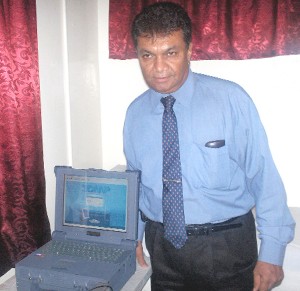A machine that could diagnose many types of heart disease using cutting edge techniques, and in as little as ten minutes, is now accessible to locals at a New Market Street laboratory.

The machine – the multiphase Electro-Myocardial Tomography mf-EMT – which is also known as the Digital Database-Driven Multiphase (SDMP) is described as a new web-based, non-invasive diagnostic tool for aiding physicians in diagnosing multiple types of heart disease, including coronary artery disease (CAD).
The machine has been in use in several countries for over ten years.
Heart patients could benefit from its use at the Multi-Tech Reference Laboratory for a fee of $75,000, which also includes consultation to see a doctor and an electrocardiograph (ECG). The results are often available within 10-15 minutes. Director of the lab Dr Errol Basso said the introduction of the machine was something new and exciting for the country and it could significantly decrease deaths from heart diseases.
He told Stabroek News on Monday that the machine “tells you how well your heart is functioning.” Dr Basso said a person could be diagnosed with a heart ailment before they start experiencing chest pains. He said he has worked as Medical Biochemist for 25 years in Canada and he imported the machine on the prompting of Minister of Health Dr Leslie Ramsammy.
Dr Basso said he also brought in some experts to demonstrate how the SDMP works and it has been in operation here for about three weeks now.
Dr Basso said the SDMP allows doctors to assess how well heart operations, such as placing a stent into a patient’s heart, have been done, instead of waiting for weeks. A doctor at the lab who did not want to be named, said the machine collects the data from the heart, non-invasively, encrypts it and transmits it to the internet which then sends it to a web-based service in the US where it is interpreted and the results returned. The actual test takes about 30 minutes, the doctor said.
He said that the SDMP adopts the principles of systems analysis in mathematically analysing the digitised ECG data. The results of the mathematical calculations are graphically represented as an auto power spectrum and its variations: phase shift, impulse response, coherence function, cross correlation and amplitude histogram. “Collectively, these mathematical transformations supply various aspects of the electromechanical properties of the heart muscle in relationship to the physiological properties of the blood and its impact on the myocardial functions as a whole,” he added. When the information is logged into the computer it analyses each individual’s transformation set to the patterns of a large population consisting of thousands of healthy people and tens of thousands of people with heart diseases collected from years of clinical research, software development and database collections. The computer analysis is then reported to a physician who determines the final diagnosis and therapeutic recommendations, if required.
Basso said Multi-Tech Reference Laboratory has a second office at Cove and John, East Coast Demerara. He said that the lab is equipped with advanced equipment technology platform to analyze patient samples and, along with its trained personnel provides high quality, reliable, affordable and timely services. Some of the other tests that the lab offers are malaria, routine chemistry and haematology, hepatitis A, B and C, HIV and cancer. Persons interested in having tests done by the machine can contact the lab at telephone numbers 227-7007 and 223-7936. Persons can also send questions by email to address guyana3dmp@yahoo.com.





